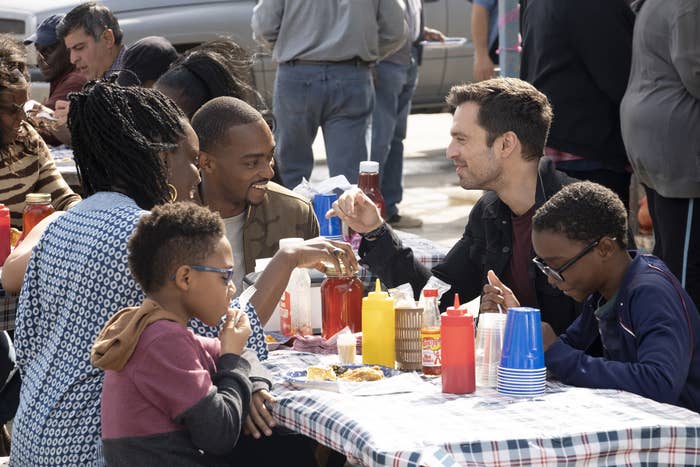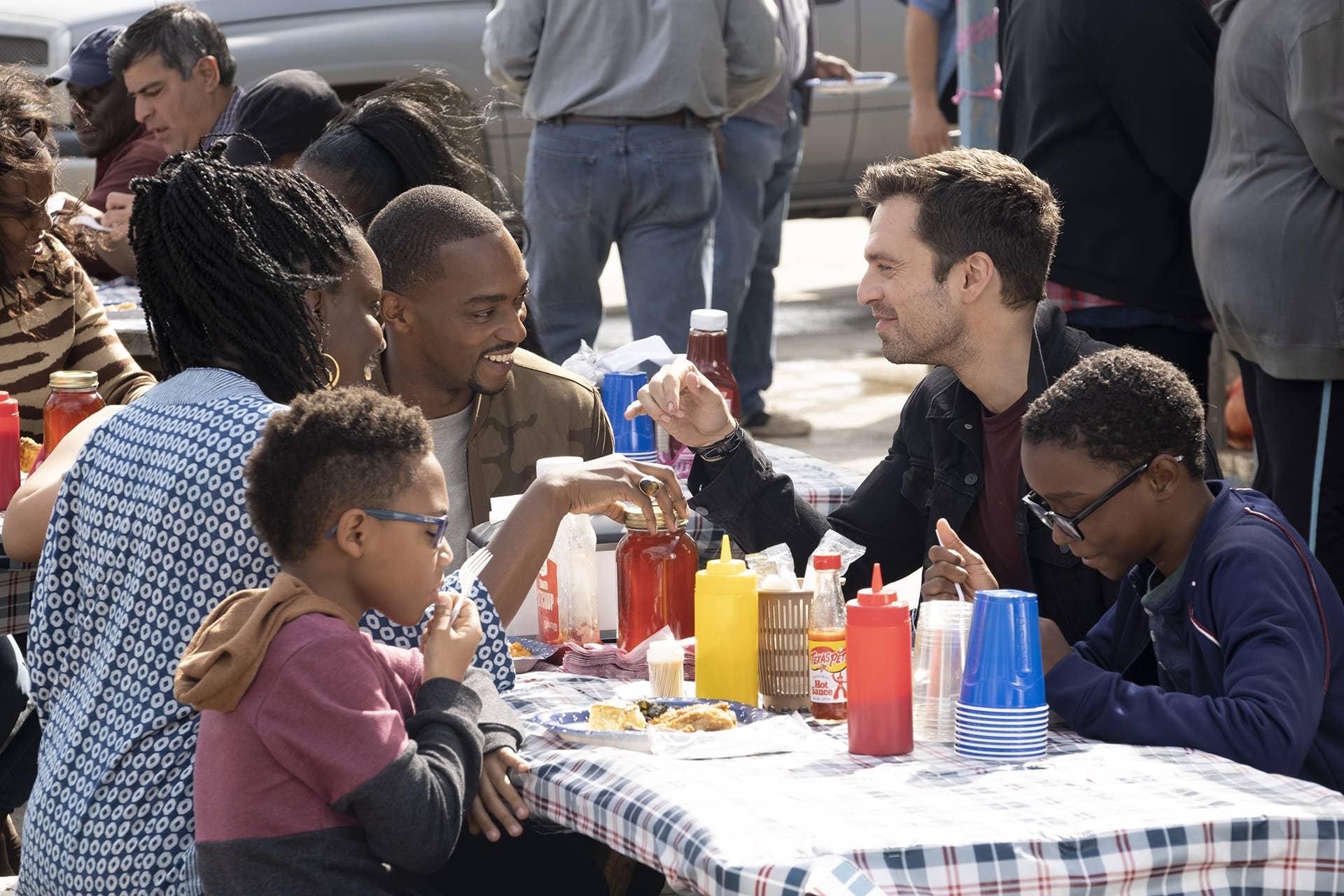
In the wake of a world-shattering event like Avengers: Endgame, the MCU has re-oriented itself, focusing on telling — for now at least—smaller-scale stories. Black Widow, Shang-Chi, and Eternals look like they’ll focus on telling tales about saving the world instead of a universe. That’s equally true for the MCU Disney+ series as WandaVision and Falcon and the Winter Soldier turn their gaze towards the dual sets of characters in their titles, playing with the themes of grief and identity. That latter theme is significant for Falcon and the Winter Soldier, which—now that we’ve reached the end of the series—feels like a show that ultimately had identity issues of its own.
From the outset of the series, Falcon and the Winter Soldier showed it was interested in having serious conversations about what the mantle of Captain America represents in our modern age and what it would mean for Sam Wilson (Anthony Mackie) to take up that shield. It’s a straightforward and compelling premise, one that provided a clear statement of intention and gave the series its own unique identity—until the show also tried to balance that weighty topic with exploring the fallout of The Snap, Bucky’s (Sebastian Stan) continued redemption and more. With a running time of about six hours, you’d think there’d be plenty of time to explore all of these equally. With this ample breathing room, the finale (“One World, One People”) barrels through all the lingering plot points and shortchanging almost every character involved.
The biggest issue with Falcon and the Winter Soldier’s resolution lies within its villain problem. A frustrating staple of most MCU projects, the series never did a great job at detailing the whys and wherefores of Karli’s (Erin Kellyman) goals. The Flag-Smashers are intended to Killmonger-esque—a nuanced villain with understandable goals—in their quest to tear down oppressive post-Blip organizations like the Global Repatriation Council. Yet, the show never entirely puts in the work to make those intentions fully clear, especially once Karli becomes increasingly aggressive in later episodes. Furthermore, the goals of the Flash-Smashers and Sam seem aligned, or at least there’s significant overlap, making it confusing as to why Sam is hell-bent on stopping them in the first place. The result feels inherently inert and emotionless.

On the other hand, the work Falcon and the Winter Soldier did with John Walker (Wyatt Russell) felt extraordinarily well-earned—until it was all completely shortchanged in the finale. Positioning Walker as a villain is too tidy; his arc as a manifestation of America’s worst impulses worked fantastically as a stark contrast to what Steve and even Sam represent as Captain America. Walker’s slow descent into madness is instantly reversed for, frankly, a setup for some sort of future MCU project—most likely Thunderbolts. Walker gets to rush into battle and is quickly validated as a hero worthy of fighting alongside Sam and Bucky. Walker’s role in the comics is to function as a morally grey hero, but the speed at which Falcon and the Winter Soldier moves Walker into this role is baffling and feels unearned considering where we left his character at the end of the last episode. Walker’s scene with Val (Julia Louis-Dreyfus) further complicates his arc, especially for comic book readers; given Val’s history as Madame Hydra, it makes sense she might be putting together a team that might eventually become the Thunderbolts (Marvel’s version of the Suicide Squad.) But considering Walker is primarily positioned as a straight hero by the series end, why would he join this team? It feels like the show is at odds with itself.
Sharon Carter’s arc doesn’t work well either. She’s not involved enough in the show to make her reveal as the Power Broker feel earned or within her character from the Captain America films. The series tells us she’s been on the run and has had to work to make her way, but it’s a classic example of telling, not showing, and doesn’t feel earned. Much like Walker’s arc, the impending double-cross in the post-credits tag feels like a setup for a second season than it does a natural evolution of her character.
However, Falcon and the Winter Soldier does work better in regards to its titular characters. The show’s fifth—and best episode, “Truth”—provides a significant amount of depth regarding the relationship between Sam and Bucky and their respective identity struggles. The finale builds upon that and cements Sam as a worthy successor to Steve Rogers. While a bit cringe-worthy in how it’s scripted, his speech works mainly off the strength of Mackie’s performance, serving as a mission statement for how this new version of Captain America will operate in this modern world. The speech is less effective when it’s tied to directly referencing the actions of Karli but works when it positions Sam as the champion of the downtrodden who believes the world can be better. Sure, the entire monologue is overly idealistic, but that’s a quintessential part of both Sam and Steve and certainly feels the most earned out of everything in the finale.
Bucky’s arc, while effective, could have benefitted from a little more time spent showing the “work” he talked about with Sam. As Bucky speaks with Yuri about his past, we cut away before we get a chance to really see the healing process between the two men and instead jump to the resolution of Yuri in the bar, seeming as if everything is normal. For such a big moment, the show could have shown more of the meat of that conversation, as it could have been a deeply powerful and resonate moment for both the show and for Bucky’s evolution as a character. Moving right to the end cut out some of its power is a bit disappointing as a result—especially considering how well the show handled the rest of the character’s arc.
Falcon and the Winter Soldier—or, I should I say, Captain America and the Winter Soldier—feels more muddled than it should, mainly because it attempted to do too much. While that’s an admirable goal, especially for a Marvel project, it’s disappointing to see the show collapse under its own weight a bit as it struggles to balance the burden of playing with big ideas and trying to set up what’s next. That future, by the way, feels uncertain. Will Captain America just exist on Disney+ now, or does he get his own film franchise once again? Will his next appearance come at the expense of the character development accomplished here? The show’s ending leaves everything up in the air in a way that’s far more frustrating than it is compelling, which is certainly not what Marvel wants in regards to one of its signature characters.


